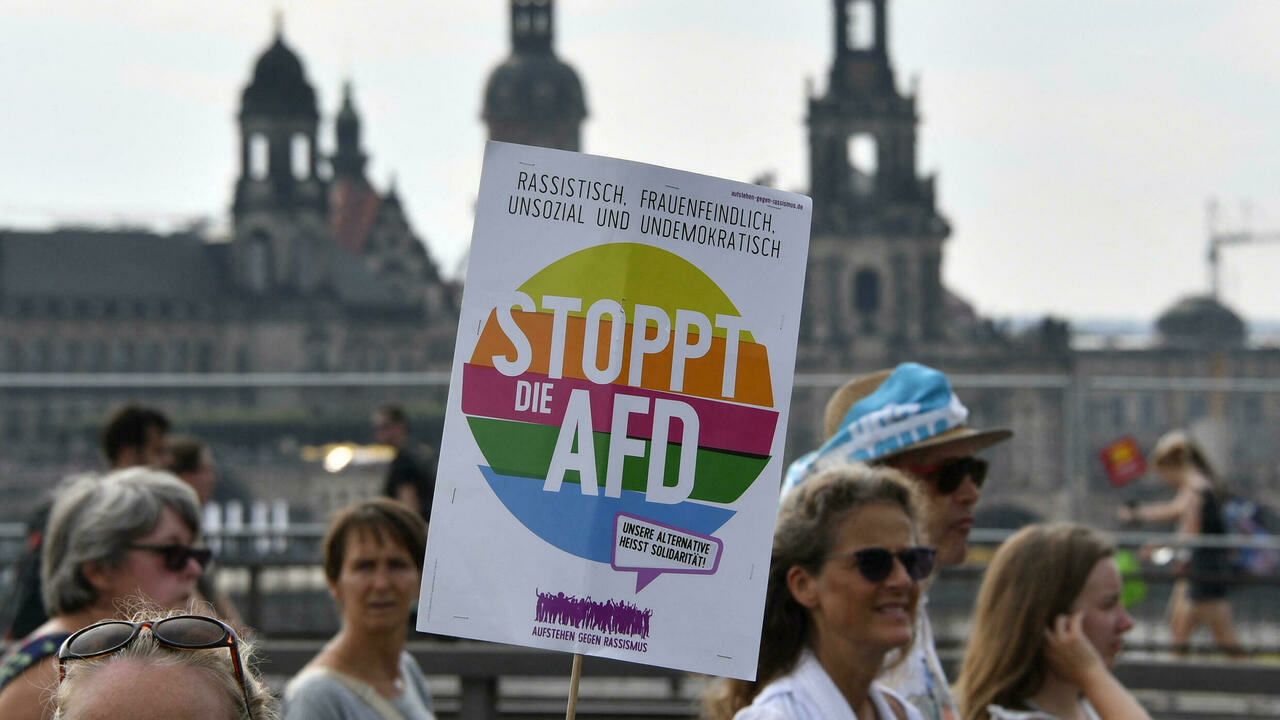
Four years after its stunning election to the German parliament, the far-right party Alternative for Germany (AfD) has been largely sidelined during an election campaign in which its favourite scapegoats – migrants, the euro and Chancellor Angela Merkel – no longer topped the agenda.
Advertising Read more
Voters in Europe’s biggest economy head to the polls on Sunday in a wide-open general election that looks set to deliver few certainties other than Merkel’s exit after 16 years at the helm.
Another foregone conclusion is the fact that whatever colour-coded coalition emerges from the vote will not include the blue hue of the AfD, the anti-immigrant, anti-euro, anti-Islam and anti-feminist outfit shunned by all other parties.
That’s part of the reason the anti-establishment upstart has garnered little attention during the campaign, just four years after it shocked Europe by becoming the third-largest party in the German parliament – and the first in postwar Germany to hail from the far right.
In 2017, the AfD was the story of the election, its tally of seats in parliament jumping from 0 to 94 in what analysts described as a political earthquake for Germany. Four years on, the prospect of the party holding on to many of those seats is being treated almost matter-of-factly, with all eyes focused on the battle to succeed Merkel.
“Germany has become a country like so many others in Europe, with a far-right party in parliament,” says Professor Markus Ziener, a research fellow at the German Marshall Fund. “We didn’t have that until 2017.”
>> The Merkel era: 16 years at Germany’s helm
While voter surveys suggest the AfD is likely to retain a sizeable foothold in the Bundestag, they also point to a stalled momentum for the far-right party, which is polling at around 11% – down from an average 15% through much of 2019 and below the 12.6% it won four years ago. The relative slump is indicative of the party’s failure to dictate the tempo and agenda of the campaign, says Ziener.
“What’s missing from their perspective is the overriding topic that was there four years ago: that of migration,” he explains. “The issue is not that pressing anymore.”
Instead, pollsters say the most pressing issue on voters’ minds is now climate change, which AfD leaders dismiss as a conspiracy.
‘Merkel must go’
Like other anti-systemic parties from the far right, the AfD draws much of its support from feelings of anger, fear and nationalistic nostalgia. Immigration has become its prime concern, but the party’s original target when it was founded in 2013 was the euro; the single currency that replaced the Deutsche Mark and bound Germany to take part in unpopular bailouts of weaker Eurozone economies.
“Once the Greek debt crisis had abated, the AfD was largely off the radar, its main argument having vanished,” says Ziener. “But then came the migrant crisis, breathing new life into the movement.”
AfD supporters pictured at a rally in Schwerin, northern Germany, on August 10, 2021 © John Macdougall, AFP
In 2015, anger at Merkel’s decision to allow hundreds of thousands of people fleeing war and poverty into the country helped drive support for the far-right party. As the country headed to the polls two years later, “Merkel must go” became a common refrain at anti-migration demos, helping to propel the AfD into parliament as the largest opposition force.
Since then, however, Europe has tightened its borders and the number of people entering the country has fallen sharply. Consequently, immigration has also slipped down the list of German voters’ main concerns. In a recent poll by the Bild daily, only 20% of voters considered migration a priority, well behind climate protection (35%) or pensions (33%).
While immigration has become a side issue in the campaign, this hasn’t stopped the AfD from trying to play it up.
“Cologne, Kassel or Konstanz can’t cope with more Kabul,” the party declared on one of its election posters – a reference to the government’s recent decision to take in several thousand Afghans who had worked for the German military or aid groups before the Taliban takeover.
The trouble for the AfD is that most Germans believe the country can and should cope, says Professor Hajo Funke, a political scientist at the Free University of Berlin, for whom the declining importance of the migrant issue is also a measure of Germany’s success in welcoming asylum seekers.
“Refugees from the Syrian conflict are much more integrated than the far right wants to believe,” he explains. “Now a majority of Germans want Afghans who helped us in their country to be welcomed as well.”
Lurching further to the right
As the migrant punching-bag fails to deliver, the AfD has turned to another crisis – the coronavirus pandemic – to drum up support, jumping on the anti-vax bandwagon in its search for a grievance and a slogan.
While the party initially called for tough measures against the virus, it soon U-turned, railing instead against the “corona dictatorship” imposed by Merkel’s government. But the move has backfired, says Ziener, noting that “opposition to vaccines is not a winning topic”. He adds: “An overwhelming majority of Germans thinks it’s absolutely essential to get vaccinated.”
>> Far-right AfD campaigns on anti-vax platform in Germany’s Bautzen
According to Funke, the AfD’s failure to capitalise on the upheaval caused by the pandemic is “a partial surprise, but one that can easily be explained by the right-wing extremism and radicalisation of this party”.
The pandemic has exposed deep divisions between party moderates and hardliners, many of whom lean towards the Querdenker (“lateral thinker”) movement – a loose grouping of libertarians and conspiracy theorists that has staged protest rallies against pandemic restrictions and lockdowns.
“They perceive Germany as a dictatorship,” says Funke. “They are very dangerous.”
That danger became tragically apparent this week when a 20-year-old petrol station worker was shot dead by a customer angry about being asked to wear a mask while buying beer. Investigators said the suspect was linked to Covid-19 conspiracy theorists and the far right.
Stephan Kramer, the head of the domestic intelligence agency in the eastern state of Thuringia, told Germany’s RND media group he was saddened but not surprised by the killing.
“The escalation of right-wing conspiracy fantasies among aggressive and violence-prone citizens has been obvious for months,” he said. “The growing aggressiveness is palpable in everyday life.”
In recent years, a string of violent hate crimes has altered perceptions of far-right extremism and of the threat it poses to society. They include the killing of a pro-migrant politician and the deadly attack on a synagogue in Halle, both in 2019, followed the next year by the killing of 11 people, most of them of foreign descent, by a far-right extremist in the city of Hanau.
The AfD has not been directly linked to hate crimes, but experts say its aggressive rhetoric has fuelled a climate of violence and fear. Last year, the party was forced to fire its spokesman Christian Luth after he was caught on camera appearing to say migrants could be “shot or gassed”. The party’s more moderate faction has been powerless to expel other hardliners who espoused racist views and are popular among the core supporters.
In the wake of the Hanau murders, concerns about growing extremism in the AfD’s ranks were sufficient for the country’s domestic intelligence agency to place much of the party under formal surveillance.
“Support for the AfD has dropped and stagnated since the Hanau murders,” says Funke. “For the first time there was a consensus among members of the public and political parties that hate speech leads to racist violence.”
‘Too toxic’ for most Germans
While Funke considers the AfD a security threat, he does not see the far-right party as a danger for German democracy and coalition building, noting that the rest of the political spectrum has built a firewall around it.
“This AfD is now totally isolated from the other, democratic parties and is perceived as a right-wing extremist party by the country’s own secret service,” he explains. “It is simply too extreme, too close to neo-Nazi ideas for the overwhelming majority of Germans. It has zero prospects of joining a coalition.”
“Everything goes upside down in Germany,” says a supporter of the far-right AfD party at a carnival parade in Duesseldorf in February 2020. © Ina Fassbender, AFP
AfD leaders, however, say it is only a matter of time before the party secures a breakthrough win in regional elections in the former East Germany, where support for the far right and opposition to immigration are strongest.
“East Germans have been through many upheavals since the fall of the Wall and some fear migrants will bring further havoc to their lives,” says Ziener. “That’s why Merkel is so disliked there, because they blame her for the turmoil.”
The far right’s ambitions in the east suffered a setback in June in regional elections in Saxony-Anhalt, where the AfD had polled neck-and-neck with Merkel’s CDU for weeks – only to trail the conservatives by a whopping 16 points when the results came through.
The result suggested the AfD may have lost touch with some voters and highlighted a rift between party hardliners, responsible for its policy platform in Saxony-Anhalt, and the less radical wing. The platform included a 2,000-euro payment for each baby born to at least one German parent, cuts in public funding for theatres promoting “anti-German” plays, and a statement that Islam is not compatible with Western culture.
The far right’s defeat also pointed to voters banding together in an anti-AfD front, says Ziener.
“The writing was on the wall that the AfD might become the biggest party in the local parliament, and that mobilised many voters to keep them out of power,” he says, noting that the far right remains equally isolated at the regional level.
“The AfD is a party nobody wants to touch, it’s seen as toxic – and rightly so,” Ziener explains, ruling out the possibility of convergence between mainstream conservatives and the far right should Sunday’s nationwide elections result in a victory for the left. He adds: “Even if the CDU gets pretty desperate I don’t see them touching the AfD.”
Daily newsletterReceive essential international news every morning Subscribe








